- Home
- Andy McNab
Aggressor ns-8 Page 8
Aggressor ns-8 Read online
Page 8
He laughed like a drain.
He laughed so hard he had to hold his sides.
‘Tell you what, Charlie,’ I said wearily, ‘you call Hazel and tell her you’re OK and I’m here, and I’ll think about it.’
PART FOUR
1
Tbilisi, Georgia
Saturday, 30 April
My sleep was broken by an announcement from the flight deck I didn’t understand a word of, and the plane began its descent. I looked out of the window, hoping to catch a glimpse of the city, but the cloud cover was too low and it was still pitch dark. Baby-G told me it was nearly 5.30 a.m. I just loved red-eye flights, they really set you up for a good day out.
I dug around in the seat pocket for the printouts I’d done at the internet café in Istanbul. I’d had a day to kill after Charlie had left the city, and I always tried to find out as much as I could about any alien environment I was about to go into. Apart from anything else, if I had to get out quick time, I’d need all the help I could get.
I tended to hit the CIA’s world report website for facts and figures, and backpacker chat-rooms for real-time information; it paid to get the view from both ends of the food chain. If I needed more, I’d log on to Google.
The Russian Federation, referred to in the local press as ‘the aggressive neighbour’, loomed over Georgia to the north, and the two weren’t exactly cosying up at the moment. Since the fall of communism, Georgia, always a predominantly Christian country, had become an independent state, very pro-West, very pro-Bush. Pro-Bush meant anti-Putin, whichever way you looked at it, and that definitely put the main man at the Kremlin’s nose out of joint.
What pissed him off even more was the fact that America and the UK had already given millions of dollars in arms and equipment to the Georgian military. It was the last thing he wanted happening in his backyard — which was why he hadn’t pulled out his troops, armour and artillery, which were officially still there as ‘peacekeepers’.
To the east lay Azerbaijan, one of the countries lucky enough to have a shoreline bordering the oil-rich Caspian Sea. Despite being Muslim, it too was backed big-time by the US, for reasons that weren’t hard to see. The BTC pipeline, built by a consortium headed by BP and on the brink of coming on-line, stretched a thousand miles from Baku and passed just south of Tbilisi as it made its way through Georgia towards the Mediterranean coast.
To the south-west was Armenia, a country I’d always reckoned must be completely devoid of any men between the ages of twenty and forty. They were all busy elsewhere, running drugs, prostitution and extortion in every city in the West, as well as every other racket that used to be Mafia copyright until these guys muscled in.
Also to the south-west lay the all-important Turkey, feeling pretty pleased with itself these days for owning the business end of the pipeline at Cheyhan, where fleets of supertankers would soon be waiting to ferry enough of the black stuff to keep the 4x4s of the UK and the east coast of America on the road for the foreseeable future. It probably felt very secure, too; the huge US air base at Incirlik was right on its doorstep.
A million barrels of oil a day were going to start pouring through the three-foot-six-inch-wide pipe some time in 2005. It would take six months to travel the thousand miles — not that Turkey would care. They knew they were now such a pivotal part of the process as far as the US and UK were concerned, that fully fledged membership of the EU was all but guaranteed, however reluctant the French and Dutch might be. Those EU-style number plates were much more than just optimism.
The Caspian Basin had often been at the centre of international attention. Back in the nineteenth century, when Tsarist Russia was having a bit of handbags with the British Empire, Kipling called the fight for oil the Great Game. Two hundred years later, the game was still very much on, but with a whole lot more players.
Everyone wanted a piece of the action. Russia had built a pipeline to the Black Sea coast. China was getting stuck in too. Some of the largest untapped energy reserves on the planet — an estimated 200 billion barrels — lay beneath the Caspian, and since the collapse of the Soviet empire it was very much up for grabs.
The US had military advisers in Georgia to train the army. The Brits were doing their bit by supplying equipment, transport and logistics and the whole effort was called the Partnership for Peace programme — in theory rebuilding Georgia’s post-communist army, but in practice training them to protect the ‘energy corridor’. The threat of sabotage by Islamic militants and ethnic separatists was constant. Whenever the boys were taking time off from harvesting their poppy crop, it would make an irresistible target.
The funniest thing I read was that the Russians had gone and built a base alongside each of the US ones, so the two sides just sat there eyeballing each other. So peace and harmony was not exactly the name of the game, particularly when you bore in mind that the Georgian government was rated one of the top ten most corrupt institutions on the planet. It all added up to a possible big-time fuck-up for Disco Charlie, which was very much why I was here.
The plane touched down and I rescued my carry-on from the overhead locker. Most of the other passengers seemed to be men, either large Turks in raincoats, liberating their packs of Marlboro, ready to light up as soon as they were inside, or locals dressed from head to toe in black. The only pair of jeans in sight was mine, bought cheap in the market, along with a jumper with a nice nylon sheen to it that was even scarier than Charlie’s.
I pulled up the collar of my bomber jacket and followed the other punters across the rain-lashed tarmac to the Soviet regime’s idea of a state-of-the-art terminal building, a mausoleum of concrete and glass. In the bad old days it would have been adorned with more than a few stirring portraits of the local-boy-done-good, Iosif Vissarionovich Dzhugashvili. Or, as he preferred to be known, Uncle Joe Stalin.
2
The inside of the terminal had been given a bit of a tart-up within the last decade or so, but it looked to me as though it had been done by the same crew who did the railways back home after privatization — the ones who’d given a lick of new paint to the old rolling stock and fixed for us to pick up a free magazine as we got on, in the hope that we wouldn’t notice that all the carriages were still in a shit state, the toilets didn’t work, and nothing arrived on time.
The immigration hall consisted of four passport control booths, each with a smiling young woman sitting behind a glass screen. I couldn’t make up my mind whether they were a girl band in their spare time, or Maria Sharapova’s training partners. I joined the visa line. So far, this country smelt of wet greasy hair.
Ahead of me was a column of raincoated Turks, staring daggers at the No Smoking signs. They obviously hadn’t been expecting them. Behind me, maybe six or seven people back, I heard a couple of Merseyside voices. I turned as casually as possible to check them out.
There were three or four of them, two with beards, all dressed in Gore-Tex jackets and practical walking trousers, and big practical boots. If it hadn’t been for the green flowery BP logos on the tags hanging from their laptop bags, I’d have assumed they might be here to open an adventure centre or run a management bonding seminar.
I turned back. At the head of the line, two immigration officers were too busy smoking and chatting to bother helping anyone get the paperwork necessary to pass through immigration and possibly be reunited with their bags.
The Turks were really getting pissed off. I wasn’t sure if it was because of the wait, or the fact that the immigration guys were hammering through the Marlboros while they couldn’t. At last, fag break over but still waffling to each other, the uniforms starting picking up passports and glowering at their owners. Charlie wouldn’t have had to go through this yesterday; he’d been waiting in Istanbul to arrange his visa in advance. He’d wanted to leave nothing to chance; unlike me, he hadn’t fancied the idea of leaving himself to the mercy of the Chuckle Brothers and the Spice Girls up ahead.
I finally reached the front o
f the line. The immigration guys sat behind a glass screen, at a Formica-covered desk about level with my waist. The younger of the two grabbed my blue US passport and arrivals form without even giving me a glance. He thumbed through the passport and finally raised his head. His face was completely expressionless. ‘No visa?’
Why the fuck else would I bother standing in the visa line? I smiled. ‘I was told to get one from you.’
If I’d had the time to go and queue up all day and get one from the consulate in Istanbul, it would have cost me forty US dollars. Now that I was here, the price had gone up to eighty. That was the theory, anyway. I couldn’t wait to hear how far these boys thought they could push their luck.
He didn’t smile back. ‘Hundred twenty dollar.’
‘One twenty?’ I toyed with the idea of aiming him at the website, but immediately thought better of it.
‘Hundred twenty dollar.’
I pulled the cash from my wallet and handed it over. It wasn’t the extra dollars I begrudged, so much as the principle of the thing. He looked at me for a couple of seconds, his gaze level. ‘Hey… Why you come?’
‘To find my friend.’ The best cover stories are always based on the truth. ‘He has left his wife and is travelling here. I’ve come to take him home.’
He leaned across to his mate, who was still gobbing off to him about something or other. The old guy nodded and smiled; he’d probably clocked the fact that he could now afford to stop by a hooker on the way home.
My guy counted out the hard currency, stuck the visa into my passport, and even fixed me a receipt. It was only for eighty dollars, but at least the visa was full-page. I gave him a grin to show him I thought I was getting my money’s worth.
I picked up my carry-on and headed for passport control. The Spice Girls all wore shiny brown uniforms. Their new national flag was emblazoned on each arm: the cross of St George, with a smaller cross in each of the white quadrants. It looked like something Richard the Lionheart would have daubed on his shield before storming Jerusalem.
3
I wandered outside. A huge concrete awning spanned the area, probably built in the ’50s to celebrate a bumper Soviet wheat harvest. Beneath it, people were jockeying for position, trying to coax their pre-Stalin-era trolleys in the direction of the taxi rank. Across the road, taxi drivers stood drinking coffee outside a row of brightly lit wooden sheds while they waited for their fares.
As I stood there trying to get my bearings, the management bonding crew climbed aboard a gleaming white Land Cruiser that I imagined was all set to whisk them away to a hot mug of tea and a full English.
I wandered over to join the ever-lengthening taxi queue. A haphazard procession of square, boxy Ladas swung towards us, their signs fastened precariously to their roofs with a couple of bungees, the same trick Silky pulled with surfboards.
The Georgian women in front of me all seemed to be either skinny as rakes, or built like bowling balls. Thirty seemed to be the point when the one turned into the other, though it was quite difficult to tell; all of them, even the ones who should have been grey, had hair that was dyed jet-black, or as dark red as a plum.
My turn came for a Lada, and a very nice mustard-and-rust one it was too. I got into the back. The windows were steamed up and the radio was going full blast in an attempt to drown out the noise of the wipers scraping across the smashed windscreen.
‘The Marriott, mate. Marriott Hotel.’
The cigarette stuck to the driver’s bottom lip bobbed up and down as he nodded. But the taxi didn’t move.
‘The Marriott. MA-RRI-OTT?’
‘Marriott! Marriott!’
The penny dropped and the Lada lurched off at a rate of not that many knots, possibly because the windscreen looked like it had been on the receiving end of a burst of semi-automatic and he was trying to see through the web of cracked glass.
The meter was covered in grease and fag ash, and had probably never been turned on. I leaned forward. The driver was in his sixties, with a bushy grey moustache and grey, slicked-back hair that curled around the collar of a black polo-neck jumper.
I rubbed my thumb and forefinger together. ‘How much?’
He gobbed off at me and of course I didn’t understand a word. Most of it sounded like Swahili, with the odd click and guttural embellishment here and there.
He remembered to turn on his headlights while he was talking, and we picked out a 110 hardtop Land Rover parked at the roadside. It was unmistakably Brit military; dull green, with MoD plates.
The driver had left his wagon and was leaning against the wing. Bulked out with a blue waterproof jacket, shaved head, stonewashed jeans and very smart, still sparklingly clean Nikes, he had to be American. Maybe he was dropping off or collecting ‘advisers’ for the Partnership for Peace programme.
I was still none the wiser about the fare as we followed a wide dual carriageway towards the city centre, just over ten miles away. I only knew that because of what I picked up off the web. There were no road signs at all, just billboard scaffold over the road that had probably once carried posters celebrating the wonders of communism. Now they seemed to be saying the same sort of thing about Coke and Sony.
As we reached the outskirts of the city, drab concrete apartment blocks sprang up on each side of the road. They’d been given a recent lick of paint, but not in any colour you’d have chosen sober. Some of the giant cubes were green, some purple. One was yellow.
This wasn’t what I’d been expecting, good roads and fresh paint. To cap it all, even at this time of the morning, in the dark, there were women out sweeping the road with the sort of brooms that Harry Potter played Quidditch on.
A convoy of olive-green military trucks towing artillery pieces passed us, going the other way, as we came into the city proper. I knew Tbilisi lay at the foot of three massive, steeply inclined hills. The river Mtkvari ran through it, north to south. We were entering from the flatter ground to the east.
As it became more built up, so did the number of dogs. They were everywhere, if not loose and pissing against every car within reach, then on a leash and being treated to their early morning walkies.
A blue-and-white was blocking the way. The two guys inside the shiny new VW Passat had their heads down for a nap; by the look of things, they’d got a bit tired running stripy police tape from each wing mirror to the wall on either side. My grey-haired friend peered through his screen, cursed and hung a right.
The smoothly surfaced road immediately gave way to a minefield of water-filled potholes big enough to hide a bus in. My driver joined all the others slaloming from side to side to avoid them. I wasn’t sure how some of them managed it, without any headlights.
This was more like the Georgia I’d been expecting. Maybe the tourist board didn’t want to deprive the punters of the authentic gulag experience, and the police were there to make sure there was no chance of us missing it. At least there were a few road signs now, in Russian Cyrillic and a language I supposed was Georgian, though the words looked more like rows of twisted paperclips.
The taxi driver crossed himself every time we passed a church. I couldn’t tell if it was out of respect, or alongside a prayer of thanks for surviving the manic driving of his fellow countrymen and the Jurassic-scale potholes.
We crossed the Mtkvari, the fastest — and brownest — river I’d ever seen, to the west bank and the city centre. The Marriott was on the main drag, another stretch of flat, freshly laid tarmac that paralleled the river. It looked every bit as big and impersonal as any I’d stayed in, though I could see it was one of the newest and smartest in the chain before I’d even got out of the cab.
Chandeliers the size of hot-air balloons hung from the ceiling of an atrium eighty feet high. Everyone inside looked as though they’d just stepped out of an Armani ad before heading for their early morning breakfast meetings; all of them, both reception staff and guests, were dressed in varying shades of black.
According to the bulletin bo
ard in reception, it was the Marriott’s honour to welcome the BP Georgia conference, and they looked forward to welcoming all delegates at 2 p.m. in the St David Room. Capitalism wasn’t just being embraced in this neck of the woods; it was being bear-hugged, then having its contact details Bluetoothed into every Blackberry in sight.
4
‘Room 258, sir.’ The concierge handed me my room card.
I thanked him and turned away, but he hadn’t finished.
‘One moment.’ He searched under the counter top. ‘This is for you.’
I took the bulky envelope. On the back was written: ‘From C.T.’
I bent to pick up my carry-on, but a young bellboy beat me to it. He guided me the four paces to the lift. I hardly needed the help, but I didn’t want to upset hotel protocol and get myself noticed. Besides, there was no way he was going to let go of the bag, or the tip.
He pressed the call button. ‘You have travelled to Tbilisi before, sir?’ The accent probably came from watching American TV shows. So did the grooming; he had hair so clean and sculpted he could have auditioned for The OC, and there wasn’t a zit or hint of stubble on his cheek.
I smiled and made all the right noises as we let a briefcase-toting American major in BDUs get out of the lift before taking it to the third floor. ‘No, but it looks very nice to me.’
He nodded and agreed, but treated me to the sort of look that said he doubted I was in any position to judge, if my choice of outfit was anything to go by.
When we got to the room, he showed me how to work the air conditioning and TV, and even took the trouble to explain that the two-litre bottles of Georgian mineral water beside it were complimentary. I knew, but I didn’t interrupt his patter. I wanted to be the grey man; or as much of one as I could be in an orange-, green-, brown- and blue-patterned jumper.

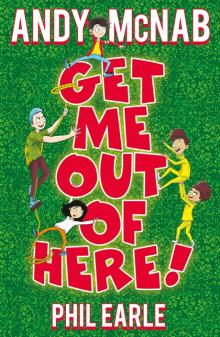 Get Me Out of Here!
Get Me Out of Here!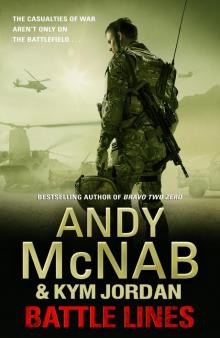 Battle Lines
Battle Lines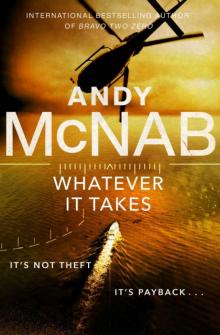 Whatever It Takes
Whatever It Takes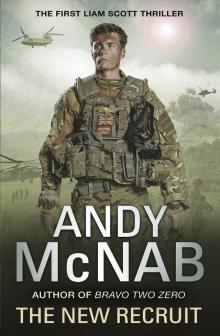 The New Recruit
The New Recruit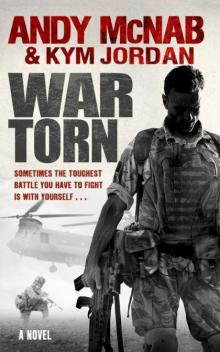 War Torn
War Torn Brute Force
Brute Force Crossfire
Crossfire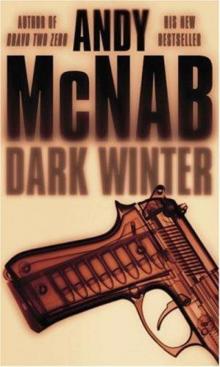 Dark Winter ns-6
Dark Winter ns-6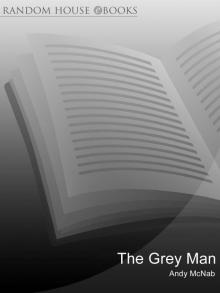 The Grey Man
The Grey Man Spoken from the Front
Spoken from the Front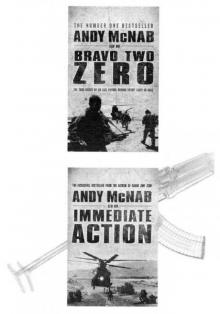 Meltdown
Meltdown Recoil
Recoil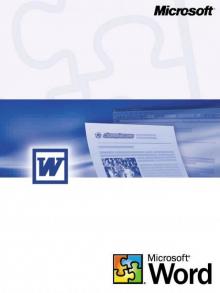 Nick Stone 1 - Remote Control.
Nick Stone 1 - Remote Control.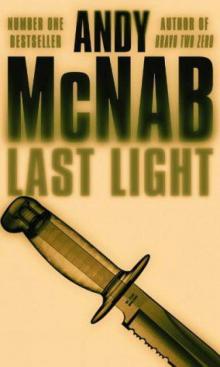 Last Light ns-4
Last Light ns-4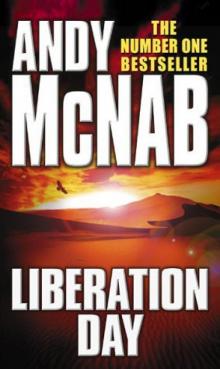 Liberation day
Liberation day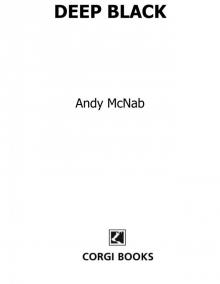 Deep Black
Deep Black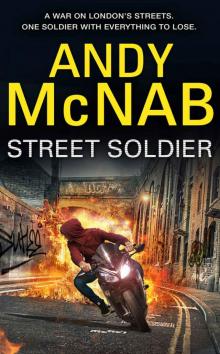 Street Soldier
Street Soldier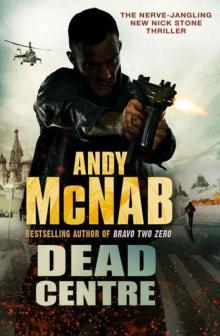 Dead Centre ns-14
Dead Centre ns-14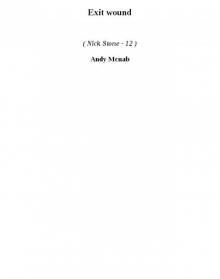 Exit wound ns-12
Exit wound ns-12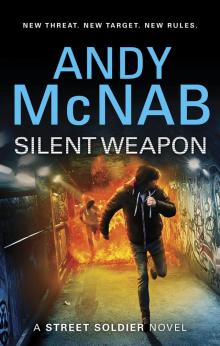 Silent Weapon
Silent Weapon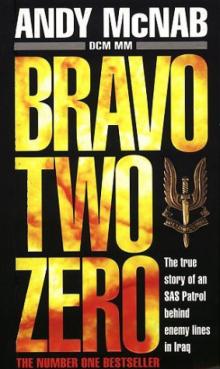 Bravo two zero
Bravo two zero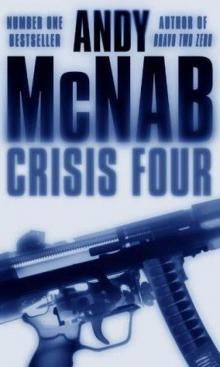 Crisis Four ns-2
Crisis Four ns-2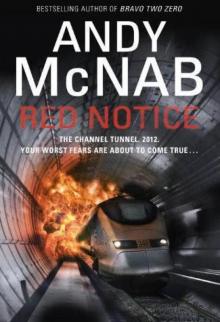 Red Notice
Red Notice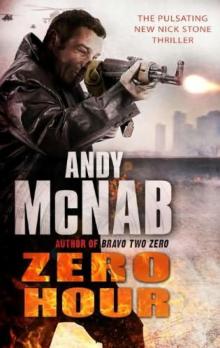 NS13 Zero Hour
NS13 Zero Hour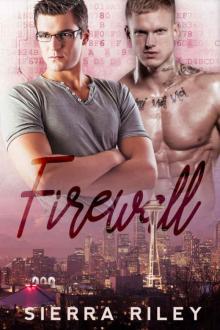 Firewall
Firewall Last Light
Last Light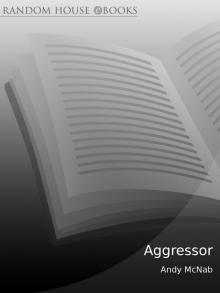 Aggressor
Aggressor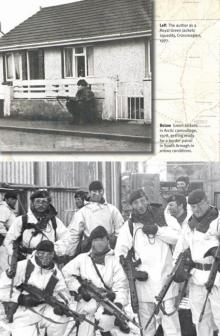 Seven Troop
Seven Troop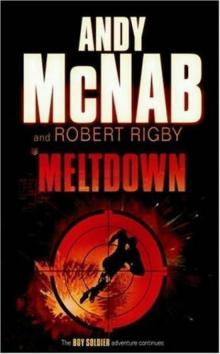 Meltdown bs-4
Meltdown bs-4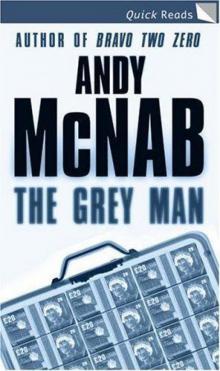 The Grey Man (quick reads)
The Grey Man (quick reads)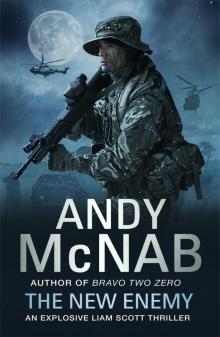 The New Enemy
The New Enemy Avenger
Avenger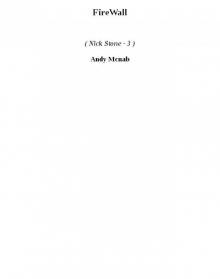 FireWall ns-3
FireWall ns-3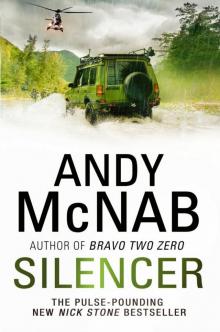 Silencer
Silencer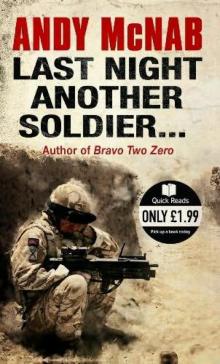 Last Night-Another Soldier…
Last Night-Another Soldier…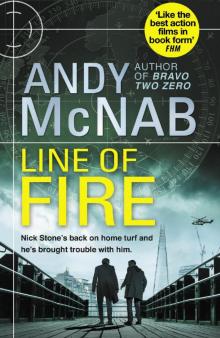 Line of Fire:
Line of Fire: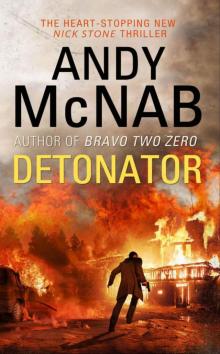 Detonator
Detonator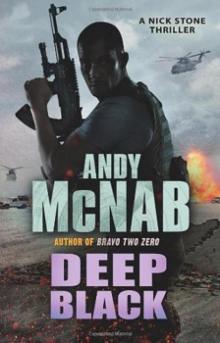 Deep Black ns-7
Deep Black ns-7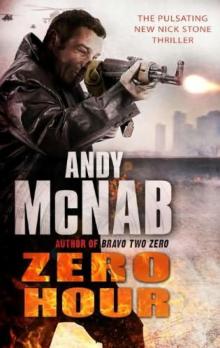 Zero Hour (2010) ns-13
Zero Hour (2010) ns-13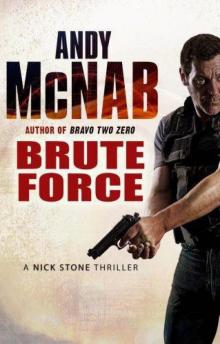 Brute Force ns-11
Brute Force ns-11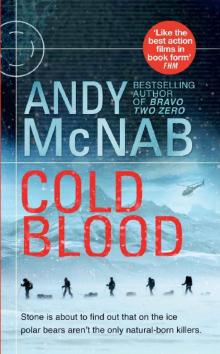 Cold Blood
Cold Blood Terminal Velocity
Terminal Velocity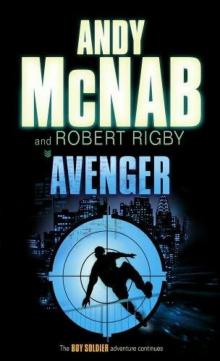 Avenger bs-3
Avenger bs-3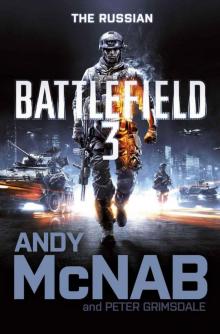 Battlefield 3: The Russian
Battlefield 3: The Russian DropZone
DropZone Zero Hour
Zero Hour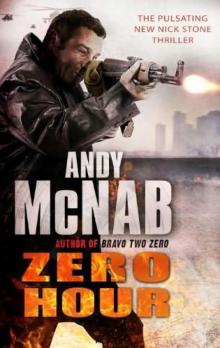 NS13 Zero Hour (2010)
NS13 Zero Hour (2010)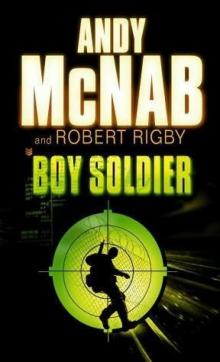 Boy soldier bs-1
Boy soldier bs-1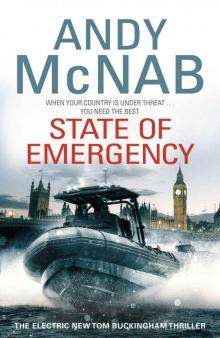 State Of Emergency: (Tom Buckingham Thriller 3)
State Of Emergency: (Tom Buckingham Thriller 3)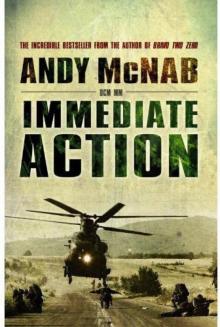 Immediate Action
Immediate Action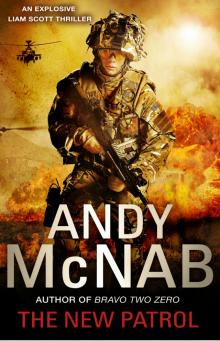 The New Patrol
The New Patrol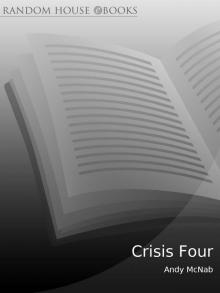 Crisis Four
Crisis Four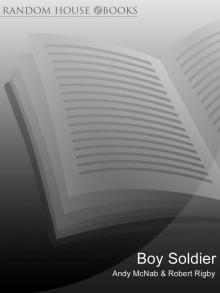 Boy Soldier
Boy Soldier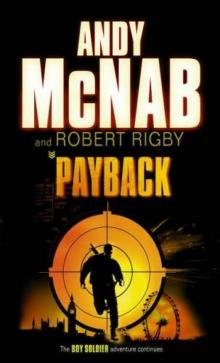 Payback bs-2
Payback bs-2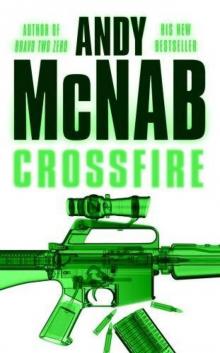 Crossfire ns-10
Crossfire ns-10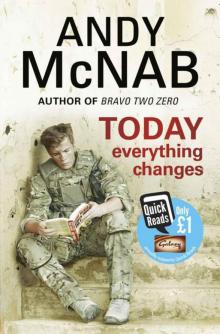 Today Everything Changes: Quick Read
Today Everything Changes: Quick Read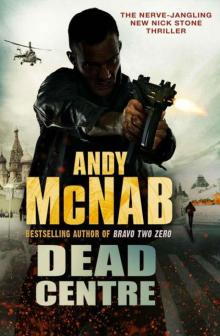 Dead Centre
Dead Centre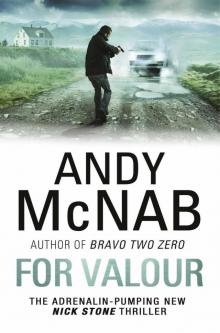 For Valour
For Valour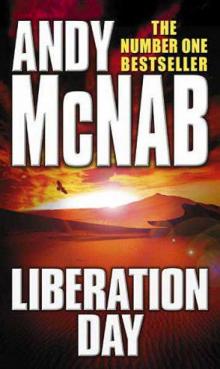 Liberation Day ns-5
Liberation Day ns-5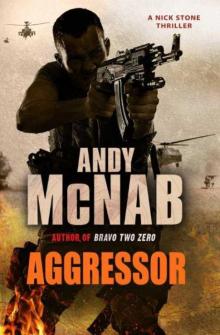 Aggressor ns-8
Aggressor ns-8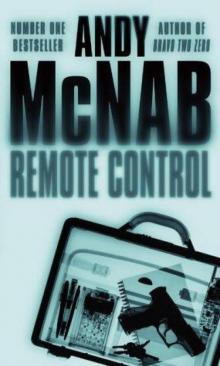 Remote Control ns-1
Remote Control ns-1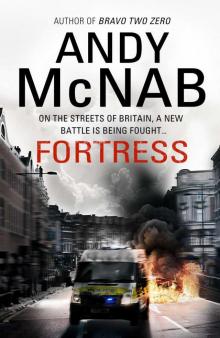 Fortress
Fortress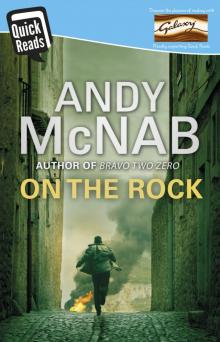 On the Rock
On the Rock Dark Winter
Dark Winter